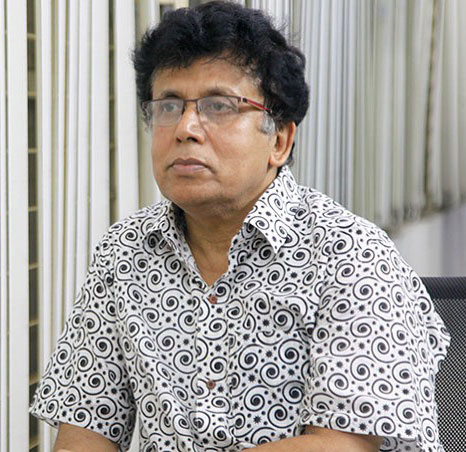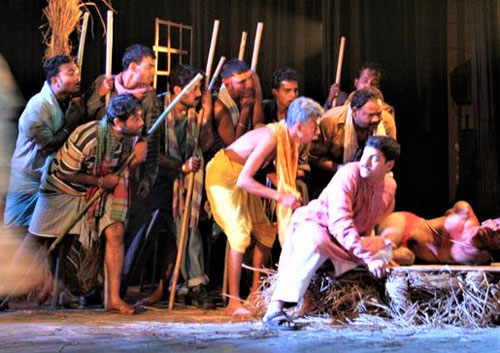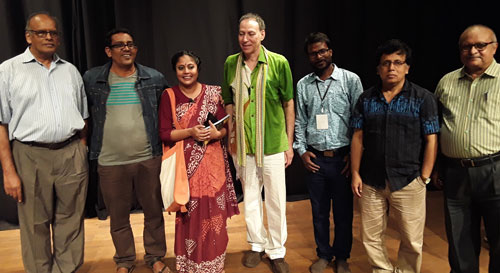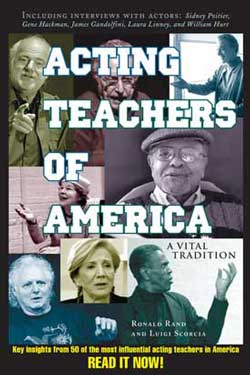A New Way of Professional Theater
The country I belong to is India, home of 1.32 billion people. Once India had one thousand six hundred and fifty-two languages, today India has one hundred and fifty regularly spoken languages. There are twenty-nine states, including West Bengal, where I live.

Dr. Asish Goswami, Professor
For a long time, I have felt our theater has been hidden from the rest of world for ages. We failed to communicate to the world that our Indian Theatre is not only just Hindi theater, but an ensemble of theater of many diverse languages and cultures.
In West Bengal’s theater, there is no village where you will not find a theater group or a theater auditorium. They may not well-equipped or in modern structures, but they house a theater for ‘a theater of the poor,’ and our theater worker always works to minimize anything lacking with their passion, love and devotion. That unconditional love for theater drives them to invest their personal salary to the theater, use all their savings to build a new production, sell personal properties to keep a theater group running.

Drama production of “Tohar Gaon Bhi Ek Din” by Prabir
We are making theater with all of our passion and love. Is that a definition necessary to be called “professional”? In some circles, to be a professional you have to have required skills, to devote time to it and earn your living from the theater. I wonder how many countries in this world have achieved this ‘professionalism’ in their theater? A few.
However, this model of professionalism is not the explanation behind the decision of the many young individuals who join theater in their twenties, except their love for the art form. Can they be called “professional?” I think our country has redefined the definition of professionalism in their own way, where the ‘workers in the theater’ put their heart on stage to create something beautiful with minimum resource and opportunity.
In the state of Bengal, there are three types of theater practiced. First is the proscenium theater, which is expensive and mostly city centric. Outside the cities, we have many small towns, suburbs and villages where we have another ‘set-up’ of theater which is festival oriented.

Bangali Theater (Flickr photo: Alan Cleaver)
During the festivals on a temporary stage, each theater group performs one-hour productions, and usually three to four are performed each evening and every group get just an hour to prepare for their performance. Turn-out of audiences is huge for these theater festivals because they happens once in a year and audience do not have regular access to watch theater and anxiously waiting for these festivals. Festivals are usually a five-to-seven days event, with twenty-five and thirty productions performed.
Sometime theater groups travel from one festival to another, with the workers traveling with their sets, dresses, lights, props, makeup. Sometimes they travel for over a week continuously from one place to another to perform in different villages at different festivals. They spend their night by traveling by rail, sometimes sleeping in rail stations or in theater rooms. They do this year after year without getting any recognition, media coverage. They do not care about whether their theater is considered “professional.” They do not usually look for money from working in the theater. They are just happy the way it is, and are ready to sacrifice many things, but they do not find meaning of their life without theater.
I do not know how theater will survive in the future world, but I certainly know that we do not have any other way to do theater in my country. In Bengal, we have another set-up of theater where performers do not need stage or any kind of proscenium theater. The performers perform out in the open, or at a rail station, a classroom of a school, in a large factory or garage or in a community hall. This could be called “alternative” theater.
All those working this way are full-time theater workers. They do not sell tickets. After each production, their remuneration is the performance, and they make their living out of whatever they receive from those who come. Are they not professional? I am sure they do not care about that answer.

. M. Safeer on stage at the Colombo International Theatre Festival with Rituparna Biswas, Subhendu Bhandari, Ronald Rand, Dr. Asish Goswami, and honored dignitaries at the Festival, 2019
In the age of consumerism. everyone has access to television and a smartphone, so why would they want to go to an auditorium and buy ticket to watch theater? Market economy is determining the fee of an artist in an art form in modern society, and I believe, that economy cuts into the artist's freedom. So, to stay out of this ‘market economy,’ you find an alternative way of theater. That is why these theater groups in my state of Bengal do their one-hour theater productions in an intimate theater. They do not expect fame, they do not expect corporate support or a comfortable life. They accept and enjoy the struggle it takes, without complaint because they have to make theater.
This is the picture of our theater in the state of Bengal. A ‘theater of the poor’ which is crafted with love and passion. We have doing this kind of theater for last two hundred years and I have full faith that it will last for next two hundred years to come. Our theater history will be written on these uncountable sacrifices of our theater workers. I would like to welcome you all to come and witness this. 2020 (Written exclusively for “The Soul of the American Actor” in Kolkata, India.)
Dr. Asish Goswami is a regular Theater critic in several newspapers and magazines across India, and is mostly known as a Theatre archivist on the theater of India and Bangladesh. Dr. Goswami has published fourteen books on theatre. An International Forum member of Monodrama under the banner of ITI, as a visiting Professor and Theater critic, Dr. Goswami has been invited as Guest Speaker and as an Observer at many theater festivals across the world.
























